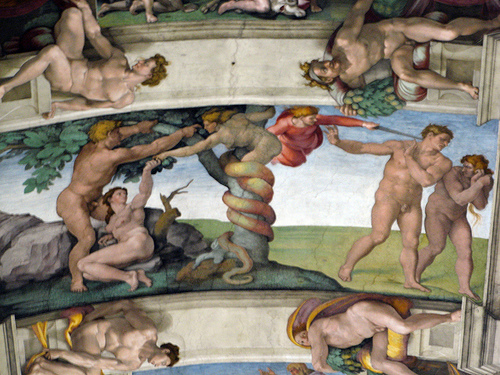We run our website the way we wished the whole internet worked: we provide high quality original content with no ads. We are funded solely by your direct support. Please consider supporting this project.

Sinful Nature and Free Will
Q: If our sinful nature is what causes us to sin/reject God, can we be held responsible for our sins, when this nature resulted from Adam and Eve’s sin? Do we really have the freedom to either choose/reject God if our sinful nature compels us to reject God?
On the other hand, if our sinful nature only influences, but does not cause us to sin, wouldn’t that mean that it is theoretically possible, however improbable, to choose to live a completely sinless life (because of the free will that we have)? How come every single human being that has ever lived will use the freedom that they have to go “that way” instead of “this way”?
Lastly, correct me if I’m wrong, but Scripture seems to suggest that if any of us were in Adam and Eve’s place, we would have chosen to do the same thing and eat of the forbidden fruit. However, if that was the case, did we really have free will to go “this way or that way”, when it seems impossible for any of us to have chosen not to eat the fruit?
A: Here are three considerations regarding “sinful nature” and our free will:
1) I do think it is theoretically possible for an individual to live a sinless life. Yet, this isn’t inconsistent with admitting that every one will inevitably sin. Think of it like this. Every car crash (let us assume) is preventable, if only drivers were more careful. Hence, it is theoretically possible that there will be no car crashes any where on the earth today — or this month — or this year — or ever. But it is certain there will be car crashes, for which drivers are responsible. The thing is, statistical certainty doesn’t negate individual responsibility. We are responsible for every sin we commit, for we didn’t need to do it. We could have done otherwise. It’s theoretically possible to go the rest of our lives without sinning. Yet, it’s certain that, over our lifetime of decisions, we will sin.
2) I see “original sin” as a) our being born screwed up in a myriad of ways, including spiritually; and b) being born in a screwed up world that is oppressed with fallen powers. This doesn’t make us sin, for sin is only sin if we could do otherwise. Yet, it does render it certain that we will eventually sin (see above). This is, in part, why we need a savior.
3) Finally, its important that we not think about this only in individualistic terms. From a biblical perspective (and now, with much confirmation from science), the human community is, in a sense, one person, extending back to Adam. We influence each other, and are responsible, in varying degrees, for one another. So we have collectively gotten ourselves into a situation where we can’t avoid sin, and the responsibility is shared by all of us. This is what Paul means when he says we were in Adam. Yet, we are now placed in Christ — all of us (I Cor. 15:22; Rom 5:14-20). It’s just that we all (including believers) tend to see ourselves and our world as though we were yet in Adam. Transitioning from Adam-thought to Christ-thought is what discipleship is all about.
Image by Randy OHC via Flickr
Category: Q&A
Tags: Adam and Eve, Free Will, Sin, Sinful Nature
Topics: Providence, Predestination and Free Will, Sin
Related Reading

How the Cross Erases Your Sin
In Colossians 2:14, we read how God canceled the charge of our legal indebtedness which stood against us and condemned us. That word “canceled,” means to wipe out, to erase, or to abolish. By means of the cross, God wiped out our indebtedness to the law that stood over us that Satan used to condemn…

Why did God create me to be a pedophile?
Question: Since the first time I experienced a sex drive it’s been directed towards little children. I’ve never acted on this, for I know it’s wrong. But it torments me. Why would God created me with pedophile cravings? Answer: I’m so sorry for your condition and greatly respect the fact that you have committed yourself…

The Lego Movie & Free Will
Last week Greg tweeted about two movies that have themes related to human free-will and God’s control of the world. They were: @greg_boyd: Does God want a permanently frozen “perfect” world or an open-ended world filled with wildly imaginative people? Watch “The Lego Movie”! @greg_boyd: Meantime, me & some peeps are going to watch (again!)…

Podcast: Do Open Theists Believe that God EVER Intercedes Directly in the World?
Greg considers God’s intervention in light of human prayer, and discusses the covenant of non-coercion. http://traffic.libsyn.com/askgregboyd/Episode_0122.mp3 [3] Swain, 40. Photo via Ted Van Peltflickr.com

Is Despair a Sin? (podcast part 1 of 3)
Greg and Dan discuss despair. Why should a person who cares so much about God’s creation that she despairs also then be guilty of a sin? Episode 575 http://traffic.libsyn.com/askgregboyd/Episode_0575.mp3

When God Needs an Intercessor
In the previous two posts, we have been exploring biblical narratives that point to how God’s knowledge is temporally conditioned and thus supports an open view of the future, or open theism as it is commonly called. The first addressed how God regrets and the second how God discovers. In this post, I want to…
